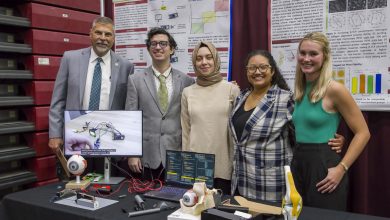So You Want to Become a Pilot?
Pete takes to the skies in his latest career adventure. Join him as he explores one of the more exciting majors a college might have to offer: piloting.
So, you want to become a pilot, huh? Hey, why wouldn’t you? After all, how many other careers give you the chance to tour the world free of charge — not to mention the high salary that can come with it. Yes, you might know you want to become a pilot, but what you might not know is all the different career possibilities that can be found in piloting. That’s why I’m here. Shall we get started?
Let’s knock out the most commonly thought of piloting career first. I’m talking about flying for an airline. Ask anyone what exactly it is they think a pilot does, and the most common response will probably be somewhere along the lines of, “Fly people from airport to airport.” And there’s not anything wrong with that. In fact, airline piloting is one of the most lucrative careers an aspiring pilot can get, with the possibility of making over $100,000 a year.

But I want to tell you about some of the other piloting careers – ones you might not even know about. For example, there’s commercial piloting — someone who is officially qualified to act as the pilot of an aircraft and be paid for their work. Now, I know what you’re thinking, “That’s EXACTLY what an airline pilot does!” Well, you’re right. However, an airline pilot also needs an Airline Transport Pilot Certificate (ATPC) in addition to a commercial pilot license (CPL).
So what can you do as a pilot without an ATPC? A whole bunch, actually. Here’s quick list of some of fields you can land in with a CPL:
Agriculture: Farmers rely heavily on pilots to prevent their crops from being gobbled up by insects and other pests. These pilots have to skillfully maneuver low to the ground, spreading pesticides over miles of crop fields.
Medical: Here’s a not-so-obvious field, even if it is one of the most important. Hospitals, large trauma centers, police departments (we’ll get to this one in a second) and private organizations all require pilots for medical evacuation, or quickly transporting the critically injured to medical treatment.
Law Enforcement: Police departments, sheriff’s offices and even federal agencies like the CIA all require pilots for various reasons, including searching for wanted and missing people, as well as keeping up with car chases.
Firefighting: Okay, one more not-so-obvious field. Fire trucks and water cannons might be the first thing you think of when I mention firefighting, but they’re not the only thing. In the case of very large fires, helicopters are often brought in to dump huge buckets of water over areas too dangerous for ground crews enter.
Maybe nether being an airline pilot or a commercial pilot interests you. That’s fine! You could always go back to where your piloting career started and become a flight instructor, passing on torch, and showing them what flying over a set of mountains and out into the horizon really feels like.
Now that you know some of the aviation career options that are out there, what’s the first step to actually become a pilot? Get a college degree of course! The best part about this first step is there are so many different options out there to choose from. You can major in aeronautical science, aviation management or even aviation meteorology. The choose is yours to make and explore. See you in the skies!
Pete the Panther
Chief Motivating Officer
%CODE1%






